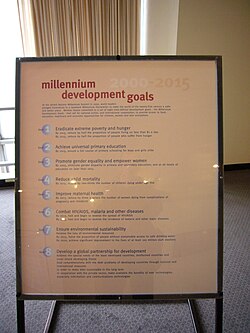ńø«µ©Ö
ŃĆīńø«µ©ÖŃĆŹ’╝īµś»õĖĆń©«ÕĆŗõ║║µł¢µś»ńĄäń╣öµā│Ķ”üķüöÕł░ńÜäńĄÉµ×£’╝īĶĆīõĖöµ£āńé║µŁżĶ©łÕŖā’╝īńé║ķüöµłÉńø«µ©ÖĶĆīÕŖ¬ÕŖø[1]ŃĆéńø«µ©Öµś»ÕĆŗõ║║µł¢ńĄäń╣öÕ£©µ¤Éń©«ńÉåµā│ńŗƵģŗõĖŗÕĖīµ£øķüöÕł░ńÜäńŗƵģŗŃĆéµ£ēµÖéńø«µ©Öµ£āµ£ēÕģȵ£¤ķÖÉ’╝īÕøĀµŁżķéäķ£ĆĶ”üÕ£©µ£¤ķÖÉÕ«īµłÉµēŹń«Śµś»ķüöÕł░ńø«µ©ÖŃĆé ńø«µ©ÖÕÅ»õ╗źµś»ń¤Łµ£¤ńÜä’╝īõ╣¤ÕÅ»õ╗źµś»ķĢʵ£¤ńÜäŃĆé ńø«µ©ÖĶ©ŁÕ«Ü ńø«µ©ÖĶ©ŁÕ«ÜńÉåĶ½¢µś»õŠØĶ¦ĆÕ»¤ńĀöń®Čńé║Õ¤║ńżÄÕĮóµłÉ’╝īµś»ńĄäń╣öÕ┐āńÉåÕŁĖõĖŁńÜäķćŹĶ”üńÉåĶ½¢õ╣ŗõĖĆ[2] Edwin A. LockeÕÆīGary P. Lathamµś»ńø«µ©ÖĶ©ŁÕ«ÜńÉåĶ½¢ńÜäÕēĄÕ╗║ĶĆģ’╝īõ╗¢ÕĆæÕ£©2002Õ╣┤ķćØÕ░ŹµŁżńÉåĶ½¢ńÜäµĀĖÕ┐āÕģ¦Õ«╣ķĆ▓ĶĪīõ║åÕģ©ķØóńÜäÕø×ķĪ¦[3]ŃĆéń░ĪÕ¢«õŠåĶ¬¬’╝īLockeÕÆīLathamńÖ╝ńÅŠńē╣Õ«ÜŃĆüÕø░ķøŻńÜäńø«µ©ÖµēĆÕĖČõŠåńÜ䵳ÉÕ░▒µ»öń░ĪÕ¢«ńÜäńø«µ©Ö’╝īµł¢µś»ŃĆīńøĪÕŖøĶĆīńé║ŃĆŹńÜäµīćńż║Ķ”üÕźĮŃĆéÕŬĶ”üµÅÉõŠøķŚ£µ¢╝ķĆ▓Õ▒ĢńÜäÕÅŹķ”ł’╝īõ║║µ£āńøĪÕŖøķüöÕł░ńø«µ©Ö’╝īĶĆīõĖöõ║║µ£ēÕ«īµłÉµŁżõ╗╗ÕŗÖńÜäĶāĮÕŖøõ╗źÕÅŖń¤źĶŁśŃĆé õŠØńģ¦LockeÕÆīLathamµēĆĶ┐░’╝īńø«µ©Öµ£āõ╗źõ╗źõĖŗÕøøń©«µ¢╣Õ╝ÅÕĮ▒ķ¤┐ÕģȵłÉÕ░▒[3]’╝Ü
µ£ēõ║øµĢÖńĘ┤µ£āÕ╗║ĶŁ░Ķ©ŁÕ«ÜÕģĘķ½öńÜä’╝łspecific’╝ēŃĆüÕÅ»ĶĪĪķćÅńÜä’╝łmeasurable’╝ēŃĆüÕŻջ”ńÅŠńÜä’╝łattainable’╝ēŃĆüÕÉłńÉåńÜä’╝łrealistic’╝ēÕÅŖµ£ēµÖéķ¢ōńø«µ©ÖńÜä’╝łtime-targeted’╝ē’╝łSMART’╝ēńÜäńø«µ©Ö’╝īõĖŹķüÄõĖŹµś»µēƵ£ēńÜäńĀöń®ČĶĆģķāĮÕÉīµäŵŁżÕĤÕēć’╝ē[4]ŃĆéSMARTÕĤÕēćµ▓Ƶ£ēÕ░ćõ╗╗ÕŗÖńÜäķøŻÕ║”ÕłŚÕģźĶĆāµģ«’╝īÕ£© LockeÕÆīLathamńÜäńø«µ©ÖĶ©ŁÕ«ÜńÉåĶ½¢õĖŁ’╝īÕ╗║ĶŁ░õ╗źõ╗źÕŠĆķĆ▓ĶĪīķüÄõ╗╗ÕŗÖńÜäÕ╣│ÕØćĶĪ©ńÅŠńé║µ║¢’╝īķüĖµōćÕø░ķøŻÕ║”Õ£©90%ńÜäõ╗╗ÕŗÖ[5][3]ŃĆé ÕĆŗõ║║ńø«µ©Öõ║║ÕĆæÕÅ»õ╗źĶ©ŁÕ«ÜÕĆŗõ║║ńø«µ©Ö’╝ÜÕāÅÕŁĖńö¤ńÜäńø«µ©ÖÕÅ»ĶāĮµś»ĶĆāĶ®”µ£ēÕźĮµłÉńĖŠ’╝īķüŗÕŗĢÕōĪńÜäńø«µ©ÖÕÅ»ĶāĮµś»µ»ÅÕż®ĶĘæõ║öĶŗ▒ķćī’╝īµŚģķüŖĶĆģńÜäńø«µ©ÖÕÅ»ĶāĮµś»Õ£©õĖēÕ░ŵÖéÕģ¦Õł░ķüöńø«ńÜäÕ¤ÄÕĖé’╝īõ║║ÕĆæõ╣¤µ£āĶ©Łµ│ĢķüöÕł░ńé║ķĆĆõ╝æńÜäÕä▓Ķō䵳¢µś»ńé║ńē╣Õ«Üńø«ńÜäķĀÉÕéÖńČōĶ▓╗ńÜäĶ▓ĪÕŗÖńø«µ©ÖŃĆé ń«ĪńÉåńø«µ©ÖÕÅ»õ╗źÕ£©õĖ¬õ║║ńö¤µ┤╗ńÜäÕÉäµ¢╣ķØóķāĮµ£ēÕŖ®ńøŖŃĆéń▓Šńó║ńÜäńףĶ¦ŻÕĆŗõ║║µā│Ķ”üõ╗Ćķ║╝’╝īµ£ēÕŖ®µ¢╝µŠäµĖģĶ”üÕ░łµ│©ńÜäõ║ŗńē®’╝īõĖ”õĖöÕ£©µŁżµÅɵść’╝īÕøĀµŁżµ£āµ£ēµäÅĶŁśńÜäÕä¬ÕģłĶÖĢńÉåńø«µ©ÖńøĖķŚ£õ║ŗńē®ŃĆéõĖŹķüÄ’╝īµīüń║īńÜäńø«µ©ÖĶ¬┐µĢ┤’╝īõ╣¤Õ░▒µś»ńø«µ©ÖĶ¦Żķøó’╝łgoal disengagement’╝ēÕÆīńø«µ©ÖÕåŹµē┐Ķ½Š’╝łgoal re-engagement’╝ēńÜäĶāĮÕŖø’╝īõ╣¤µś»ÕüźÕ║Ęõ║║ńö¤ńÜäõĖĆķā©õ╗Į[6] ńø«µĀćĶ«ŠÕ«ÜÕÆīĶ©łńĢ½ÕÅ»õ╗źÕĖČõŠåķĢʵ£¤ńÜäķĪśµÖ»ŃĆüõĖŁń©ŗńÜäõĮ┐ÕæĮÕÅŖń¤Łµ£¤ńÜäÕŖ©µ£║’╝īÕÅ»õ╗źķøåõĖŁµäÅÕ£¢ŃĆüµģŠµ£ø’╝īńŹ▓ÕÅ¢ń¤źĶŁś’╝īõĖ”õĖöµ£ēÕŖ®µ¢╝ńĄäń╣öńøĖķŚ£Ķ│ćµ║ÉŃĆé µ£ēµĢłńÜäńø«µĀćĶ«ŠÕ«ÜÕÆīĶ©łńĢ½õ╣¤Õīģµŗ¼Ķ¬Źń¤źÕÆīĶÖĢńÉåµēƵ£ēµ£āńĀ┤ÕŻ×ÕŖ¬ÕŖøńÜäÕģ¦ń¢ÜŃĆüÕģ¦Õ£©ĶĪØń¬üõ╗źÕÅŖķÖÉÕłČµĆ¦ńÜäõ┐ĪÕ┐ĄŃĆéķĆÅķüÄĶ©ŁÕ«ÜµĖģµźÜÕ«ÜńŠ®ńÜäńø«µ©Ö’╝īõ╣ŗÕŠīÕÅ»õ╗źĶĪĪķćÅńø«µ©ÖÕ»”ńÅŠńÜäń©ŗÕ║”’╝īÕÅ»õ╗źÕŠ×ķĆÖõ║øµ╝½ķĢĘõ╣¤ÕÅ»ĶāĮÕø░ķøŻńÜäķüÄń©ŗõĖŁń£ŗÕł░ÕģČķĆ▓ń©ŗŃĆé ÕÅéĶĆāµ¢ćńī«
|













